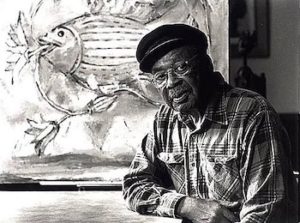
Claude Clark
*Claude Clark was born on this date in 1915. He was a Black painter, printmaker, and art educator.
Claude Clark was born on a tenant farm in Rockingham, Georgia. In early August 1923, Clark's parents left the South for a better life in Philadelphia, Pennsylvania, during the Great Migration. Clark attended Roxborough High School, where he wrote poetry and discovered a talent for painting. His Sunday School teacher encouraged him to exhibit in Sunday class and church.
Clark studied at the Philadelphia Museum School of Industrial Art (now the University of the Arts (Philadelphia)) (1935–1939) following high school graduation. He applied to and was eventually accepted to the Barnes Foundation in 1939. In 1941, Clark met Effie May Lockhart from California. They married in June 1943 and formed a partnership in art, education, and philosophy. He continued teaching art in the Philadelphia Public School system during the early years of their marriage. The couple moved to Alabama and California while continuing their careers.
During the Great Depression, Clark contacted the Artists Union for work through the Works Progress Administration (WPA). He worked with the WPA from 1939 to 1942. Clark joined the graphics art shop, working with Raymond Seth and Dox Thrash. Clark was the subject of many articles and publications. He also was the author of A Black Art Perspective, a Black Teachers Guide to a Black Visual Arts Curriculum, Merritt Press 1970. As a Black West Coast Arts Movement member, he co-developed the first African American Studies curriculum. He also mentored and supported many young emerging scholars and artists. Clark matured in art by recognizing his opportunity to develop without being constrained by the racism, poverty, and inherent inequality of circumstance prejudice that labels bring.
His work exhibited social realism and modern and abstract styles. When Clark could not afford paint, he salvaged throw-away paint cans from trash bins in the back of art schools and mixed his own. Unable to buy paintbrushes and chemicals to clean them, he mastered using the palette knife. Clark painted and exhibited from a very early age and sold his first works in his early twenties. Collectors continue to seek Clark's works 70 years later. Clark worked various jobs throughout the late 1930s and mid-1940s before accepting a position as an art instructor with Philadelphia Public School from 1945 to 1948.
He became interested in working for a Black college as his interest in African and African American history developed. He accepted a position at Talladega College, Talladega, Alabama, as an associate professor of art (1948–1955). Clark painted, taught, exhibited, and researched his interests further while supporting his family, which consisted of a wife, Effie, son Claude Lockhart Clark, and daughter Alice. In 1955, while teaching at Talladega, Clark began feeling the financial pressures and moved his family to his wife's native California to seek greater opportunity. Clark enrolled in Sacramento State University and taught art classes to other undergraduate students while obtaining his Bachelor of Arts.
Following graduation in 1958, Clark accepted an art instruction position with Alameda County, California (1958–1967) and eventually secured a faculty position within the University of California system as an art instructor (Merritt College, 1968–1981). He helped curate the first national African American exhibition at the Oakland Museum in 1967. Clark continued to paint, research, and exhibit throughout this period.
Clark worked from his studio in Oakland, California, from 1981 to 1998, following his Merritt College retirement. He has exhibited in the United States, Africa, the Caribbean, Europe, and South America. Clark's subject matter was the diaspora of African American culture, including dance scenes, street urchins, marine life, landscapes, and religious and political satire images executed primarily with a palette knife. Claude Clark died in Oakland, California, on April 21, 2001, after a long illness.
A Retrospective Exhibition, 1937-1971, Paintings by Claude Clark, Fisk University, Nashville, Tennessee, 1972
Claude Clark: On My Journey Now: A Selection of Paintings from 1940-1986, The Apex Museum, Atlanta, Georgia, 1996.